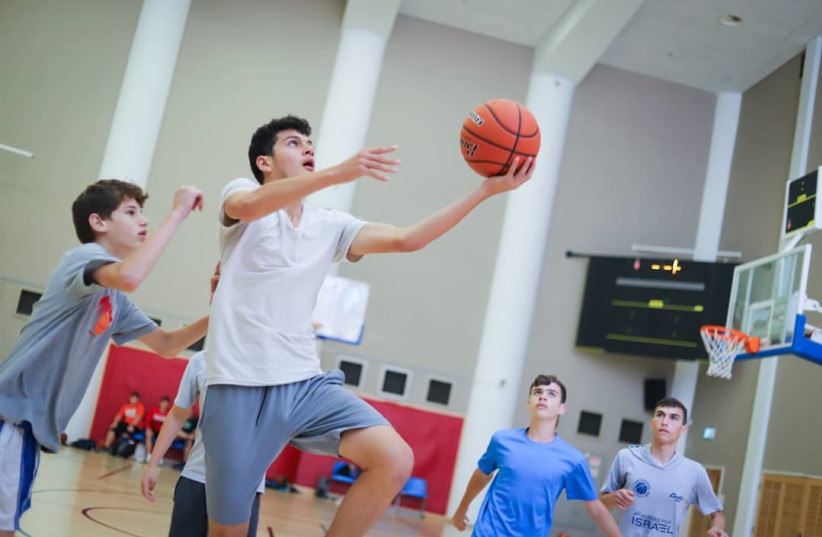School is almost out for summer in Israel, which means that many kids will be on their way to local camps to stay busy and, hopefully, learn something new.
For more stories from The Media Line go to themedialine.org
From playing basketball with NBA stars, to taking care of exotic zoo animals, or learning invaluable tech skills, summer camps in Israel are gearing up for what they hope will be a post-pandemic comeback.
After years of stringent health restrictions to prevent the spread of the coronavirus, which limited gatherings and prevented foreign nationals from entering the country, camps are reporting a strong recovery and even waitlists as parents clamber to enroll their young ones in summer activities.
“It’s sold out with a long waiting list; there’s a big demand,” Tamir Goodman, who runs a high-profile basketball camp, told The Media Line.
Goodman, a former professional basketball player, hosts an annual weeklong camp at the YMCA’s new sports complex in Jerusalem. It features world-class NBA personalities and coaches, and is capped at 45 participants ages 11-17. The camp is open to locals and tourists and costs $600.

This year, NBA champion Eddy Curry, who played with LeBron James for the Miami Heat, is set to join the program.
Goodman also is running a second sold-out day camp in partnership with NBA star Enes Kanter Freedom for boys and girls.
“The kids get the chance to learn from an NBA champion.”
Tamir Goodman, former professional basketball player
“The kids get the chance to learn from an NBA champion,” he said.
Although the camp used to have an overnight option, COVID-19 forced Goodman to pivot his business model.
“I think the biggest difference that we’re emphasizing right now is that everyone has to bring their own food and not share their food with other campers,” he explained. “Before this we were serving catered food.”
For youngsters that prefer to live on the wild side, the Jerusalem Biblical Zoo and Aquarium hosts a one-of-a-kind experience.
The day camps teach elementary school children the important role that zoos and aquariums play in wildlife conservation, as well as how to take care of exotic animals. It also provides a behind-the-scenes look at how zoos operate.
“The idea is to show them all the different activities of the zoo from A to Z in an experiential way,” said Maya German, head of marketing and customer experience at the Tisch Family Zoological Gardens in Jerusalem and the Gottesman Family Israel Aquarium in Jerusalem.
“The idea is to show them all the different activities of the zoo from A to Z in an experiential way.”
Maya German, head of marketing and customer experience at the Tisch Family Zoological Gardens in Jerusalem
“The kids try out the kitchen and learn how to prepare food for the animals, which food is appropriate for which animal, and how to weigh the food and serve it,” she told The Media Line. “They also visit the clinic to see how animals are medically treated.”
Each session is two weeks long and run in Hebrew, although German said that there is a willingness to open an English group if there is demand for one. It costs $480 for the short-day sessions, ending each day at 1:30 p.m., and $570 for the full-day session. Discounts are available for zoo members and all kids receive a light lunch.
In total, some 180 kids are expected to take part this summer.
“The goal of the camp is for the kids to have fun and they’re sold out very quickly,” German noted. “Kids want to come back every year. They really get to know the caretakers and workers, and if we could we’d open many more groups.”
Last year, the zoo camp was able to stay open during the height of the delta wave of COVID-19 because most of its activities are held outdoors. To protect animals from being potentially exposed to the coronavirus, kids have to wear masks when entering pens and enclosures.
“When they visit the monkeys – who really resemble us genetically – the kids will be asked to wear masks for a few minutes,” German explained.
Other kids are in for a summer of hi-tech hijinks.
The BIG IDEA summer camp is an American-style sleepaway camp that helps youths ages 7-17 gain important skills that could catapult them into lucrative careers later on.
It takes place over July and August in Meir Shfeya, a youth village located near the coastal city of Zichron Yaakov.
Its educational workshops are entirely in English in order to prepare youngsters for jobs in the tech arena. Kids and teens can choose from a wide variety of different skill sets, including video editing, animation, 3D modeling, coding, robotics, photography and graphic design.
“The idea is to use the tech field as a ground for self-development,” Nirit Haklai, chief program officer of BIG IDEA, told The Media Line. “We have almost 40 different workshops that the kids can choose from.”
There are both seven-day sessions and 13-day sessions to choose from; each come with full room and board. The shorter track costs $1,500, while the longer one costs roughly $2,600.
One interesting rule in BIG IDEA, which may come as surprise for a program focused on building tech know-how, is that campers are not allowed to bring or use personal phones.
“The idea is for them to come to camp and have the freedom to be who they choose to be.”
Nirit Haklai, chief program officer of BIG IDEA
“The idea is for them to come to camp and have the freedom to be who they choose to be,” Haklai said of the rule.
“COVID tampered with our plans,” she added. “Before COVID we reached over 900 kids for the summer. But this year is going to be fun and games.”
